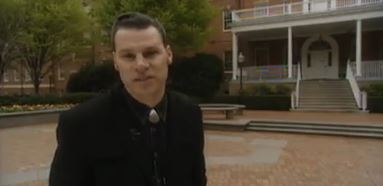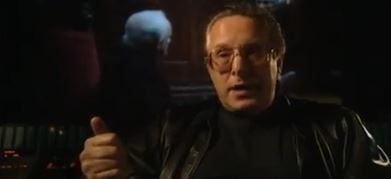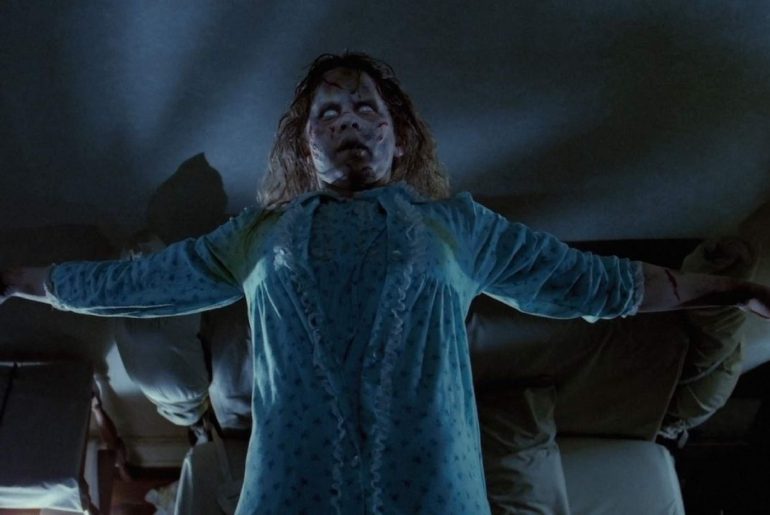NB: thanks to Simon Brew of Film Stories magazine for forwarding the link to watch a preview copy of this doc.
I first saw The Exorcist in a cinema during a Halloween showing in 1998 the same year Mark Kermode’s documentary first appeared. The film was still unavailable for home viewing back then, a status conferred during the 1980s when the Video Nasty moral panic was in full swing, and by 98 it had gained its full status as the ultimate horror film, one that had people running from cinemas back in 1973 when first released. It was with much excitement and trepidation that I approached the screening that night. I’d love to say that my experience mirrored those seen in 1973, but sadly the packed crowd in Theatr Gwynedd struggled to take the film seriously (myself included). When Regan vomited, we laughed.
For many years the appeal of the film eluded me until I started teaching a module on Shocking Cinema. I decided to revisit it, analysing it in detail and discussing with learners the original hysterical reactions the film provoked. This was, after all, a film condemned as evil by Billy Graham and one that pushed moral campaigners like Mary Whitehouse to fervent levels of apoplexy. There must have been something about it; when it was shown in Birmingham a Christian group went so far as to distribute leaflets to film-goers with a helpline for discussing the film’s issues.
Time has certainly withered it’s shock value but I have come to appreciate it, particularly as a drama about faith with Father Karras, played with great sensitivity by Jason Miller, at it’s centre. The more I see the film the more I admire its pacing, design, use of sound and imagery. It may not scare me, but I can enjoy it. I am, in my own odd way, a fan of The Exorcist.
Kermode, on the other hand, has long shared his love for the film, a love born from watching its trailer as a terrified 11 year old. The Fear of God is his tribute, a making of documentary that’s done the rounds since 1998 but has never been widely seen in its full form (except at film festivals) until now, released on the BBC iplayer this Halloween. It’s a thorough and entertaining look back at the film’s production and a shockingly young Kermode pops up now and then to link the various elements from writer William Peter Blatty’s inspiration to the scenes of audience emerging terrified from cinemas. Mostly the documentary lets the cast and crew speak for themselves, their talking heads intercut with behind the scenes footage and some alternate takes (some of which have been subsequently included in re-releases of The Exorcist on DVD).

There’s some great information included, although much has lost it’s novelty since 1998 as the internet has allowed such facts to be dispersed to hungry fans more easily. Some good fun can be had at the thought of alternative history versions threatened during production – imagine the film starring Jane Fonda and Paul Newman – and the sections on practical effects and sound mixing remind us of how ground-breaking the film was. Today we’re saturated with supernatural horror and exorcism films; it’s fun to step back to a time when such things were pushing the envelope, all on a major studio’s dime. The film was one hell of a risk for Warner Bros, but one that paid off handsomely.
All the principal cast appear and recount their experiences, including their views of the fabled “curse” that supposedly dogged the set. Most buy in, only the dry witted Max von Sydow dismissing such ideas (in part due to his Swedish Protestant upbringing, where the devil was a figure of fun). In some ways it’s quite surprising to see how deeply some of them accept the idea that evil is somehow present in the film – it’s certainly marked Friedkin who’s since gone on to make the documentary The Devil and Father Amorth about a real Vatican exorcist.
As these documentaries go The Fear of God is exemplary and to discuss in too much detail would render it moot – so go watch it. Before you do though I would like to discuss one aspect of Kermode’s film I found more disturbing than The Exorcist itself, and that’s director William Friedkin.

Friedkin’s star was on the rise in 1973, having brought multiple Oscar winner The French Connection to the screen in 1971. His background in documentary gives both The French Connection and The Exorcist a grounding in reality which was new to their genres and the latter film represents a high point in his career (some of his later films, such as Sorcerer and Cruising are important, although none would come close to the impact of The Exorcist) and he stands as a director of note during the New Hollywood period. But some disclosures during the documentary give me pause and ask questions not just of Friedkin but of the auteur led approach to cinema prevalent during the 70s. Although mostly recounted with smiles, stories of Friedkin firing guns on set to shock actors, slapping another in the face and having his star Ellen Burstyn yanked across a set for one effect (causing her injury) suggest a level of control and recklessness that borders on abuse. It reminds of Kubrick’s direction of Shelley Duvall on The Shining or Maria Schneider’s treatment on the set of Last Tango in Paris. The Exorcist is often read as a treatise on male power – the Catholic Church as a symbol of male authority fighting with the devil over a young girl’s body – but in it’s production we find a real example of this power in action. When Friedkin nods to his special effects guy to pull Burstyn at full force, against her wishes, her safety is ditched for the shot, her consent never asked for. She may laugh about it now, as she does here, but behind the smile there is clear anger. It’s little wonder she calls Friedkin a “maniac”. Some will argue that it was worth it for the film, that we’re too sensitive now, etc. Maybe. But if you hire a priest to be in a film don’t be surprised when he struggles to get into the emotionality of a scene. One answer would be to slap him. Another would be to hire an actor instead. These are little glimpses into a version of the film’s production that’s less glowingly recounted, more problematic and it’s a bit of a shame we don’t get to know more – but this is a documentary as act of love for a film, not an exploration of its director.
46 years after it’s first release, and 21 years since I first saw it, The Exorcist still doesn’t scare me, but I think working with William Friedkin would.

